Questioning the vast wealth and property holdings of Chinese Nationalist Party (KMT) Taipei mayoral candidate Sean Lien (連勝文), several Democratic Progressive Party (DPP) Taipei city councilors accused Lien of setting up business ventures that are nothing more than a “Trojan Horse” for Chinese conglomerates to buy up Taiwan.
Councilors Liang Wen-chieh (梁文傑), Lee Chien-chang (李建昌), and council candidate Chien Shu-pei (簡舒培) released a brochure saying that Lien’s business ventures are opening up back doors for Chinese companies to purchase properties and companies in Taiwan.
DPP City Councilor Wang Shih-chien (王世堅) had earlier added flourish to his accusations by bringing in a 3.5m-high “Trojan Horse” prop imprinted with the flag of the People’s Republic of China (PRC) during a question-and-answer session at the Taipei City Council on Monday.
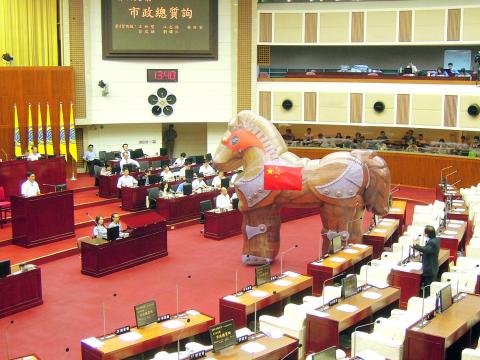
Photo: Lin Shu-hui, Taipei Times
Wang said that if Lien is elected Taipei mayor, “then it will be history revisited because it is the ‘Trojan Horse’ ploy to enter our city, our nation,” as he pointed to his prop.
“Lien’s family has a very cozy relationship with China, and he has visited [China] more than 20 times, paying tribute and kowtowing to Chinese officials,” Wang said.
“We urge Taipei voters to reject Lien through their ballots. We must not elect this person with such intimate ties to China. We shall not let this Chinese ‘Trojan Horse’ succeed,” he said.
Liang said that Lien’s father and grandfather accumulated great wealth within a relatively short period.
“They did it through devious means, by taking over public land and turning them into family properties, converting agricultural land into real-estate developments and hiding the Lien family assets by manipulating figures in holding companies and foundations,” Liang said.
“Lien lives in the luxurious Palace Mansion in Taipei and drives a Porsche coupe, but when he was chairman of [state-run] Taipei EasyCard Corp, he did not include the car in his personal asset disclosure report. It was a wilful attempt to hide his wealth,” Liang said.
Lee said Lien’s family established Kai Yu Research Co, a 50-50 joint venture with China’s state-owned China Development Bank.
“Lien’s campaign platform promotes the formation of a financial holding company for investment by the Taipei City Government. It is actually a conduit for Chinese conglomerates to swallow up properties and companies in Taiwan,” Lee said.
The DPP councilors demanded that Lien and his family make a full disclosure of their real-estate holdings throughout Taipei.
“The public has a right to know, because if Lien is elected mayor, then he and the city government will likely generate more wealth through urban renewal projects catering specifically to the properties of Lien and his family,” Lee said.
Responding to the accusations, Lien’s campaign office said his father and grandparents were civil servants and displayed exemplary conduct in service.
As for the family’s wealth, it was accumulated through successful business management, it said.
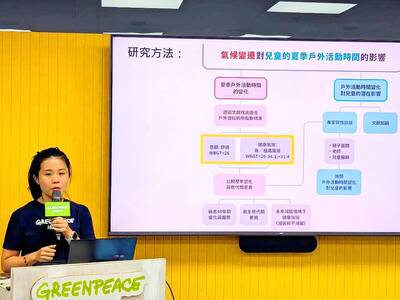
The government should improve children’s outdoor spaces and accelerate carbon reduction programs, as the risk of heat-related injury due to high summer temperatures rises each year, Greenpeace told a news conference yesterday. Greenpeace examined summer temperatures in Taipei, New Taipei City, Taoyuan, Hsinchu City, Taichung, Tainan and Kaohsiung to determine the effects of high temperatures and climate change on children’s outdoor activities, citing data garnered by China Medical University, which defines a wet-bulb globe temperature (WBGT) of 29°C or higher as posing the risk of heat-related injury. According to the Central Weather Administration, WBGT, commonly referred to as the heat index, estimates
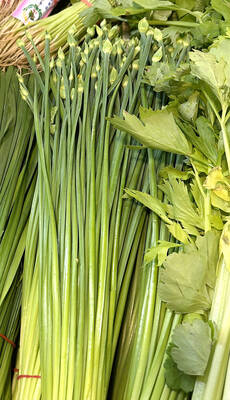
The Taipei Department of Health’s latest inspection of fresh fruit and vegetables sold in local markets revealed a 25 percent failure rate, with most contraventions involving excessive pesticide residues, while two durians were also found to contain heavy metal cadmium at levels exceeding safety limits. Health Food and Drug Division Director Lin Kuan-chen (林冠蓁) yesterday said the agency routinely conducts inspections of fresh produce sold at traditional markets, supermarkets, hypermarkets, retail outlets and restaurants, testing for pesticide residues and other harmful substances. In its most recent inspection, conducted in May, the department randomly collected 52 samples from various locations, with testing showing
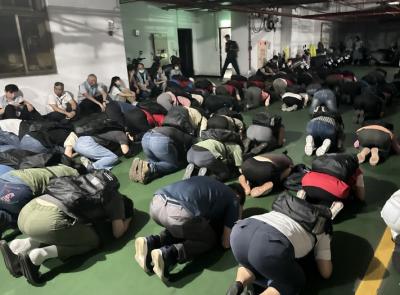
Taipei and other northern cities are to host air-raid drills from 1:30pm to 2pm tomorrow as part of urban resilience drills held alongside the Han Kuang exercises, Taiwan’s largest annual military exercises. Taipei, New Taipei City, Keelung, Taoyuan, Yilan County, Hsinchu City and Hsinchu County are to hold the annual Wanan air defense exercise tomorrow, following similar drills held in central and southern Taiwan yesterday and today respectively. The Taipei Mass Rapid Transit (MRT) and Maokong Gondola are to run as usual, although stations and passenger parking lots would have an “entry only, no exit” policy once air raid sirens sound, Taipei
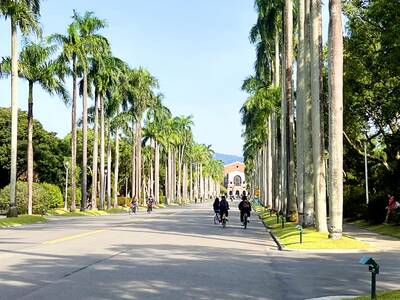
Taipei placed 14th in the Quacquarelli Symonds (QS) Best Student Cities 2026 list, its highest ever, according to results released yesterday. With an overall score of 89.1, the city climbed 12 places from the previous year, surpassing its previous best ranking of 17th in 2019. Taipei is “one of Asia’s leading higher-education hubs,” with strong employer activity scores and students “enjoying their experience of the city and often keen to stay after graduation,” a QS staff writer said. In addition to Taipei, Hsinchu (71st), Tainan (92nd), Taichung (113th) and Taoyuan (130th) also made QS’ list of the top 150 student cities. Hsinchu showed the